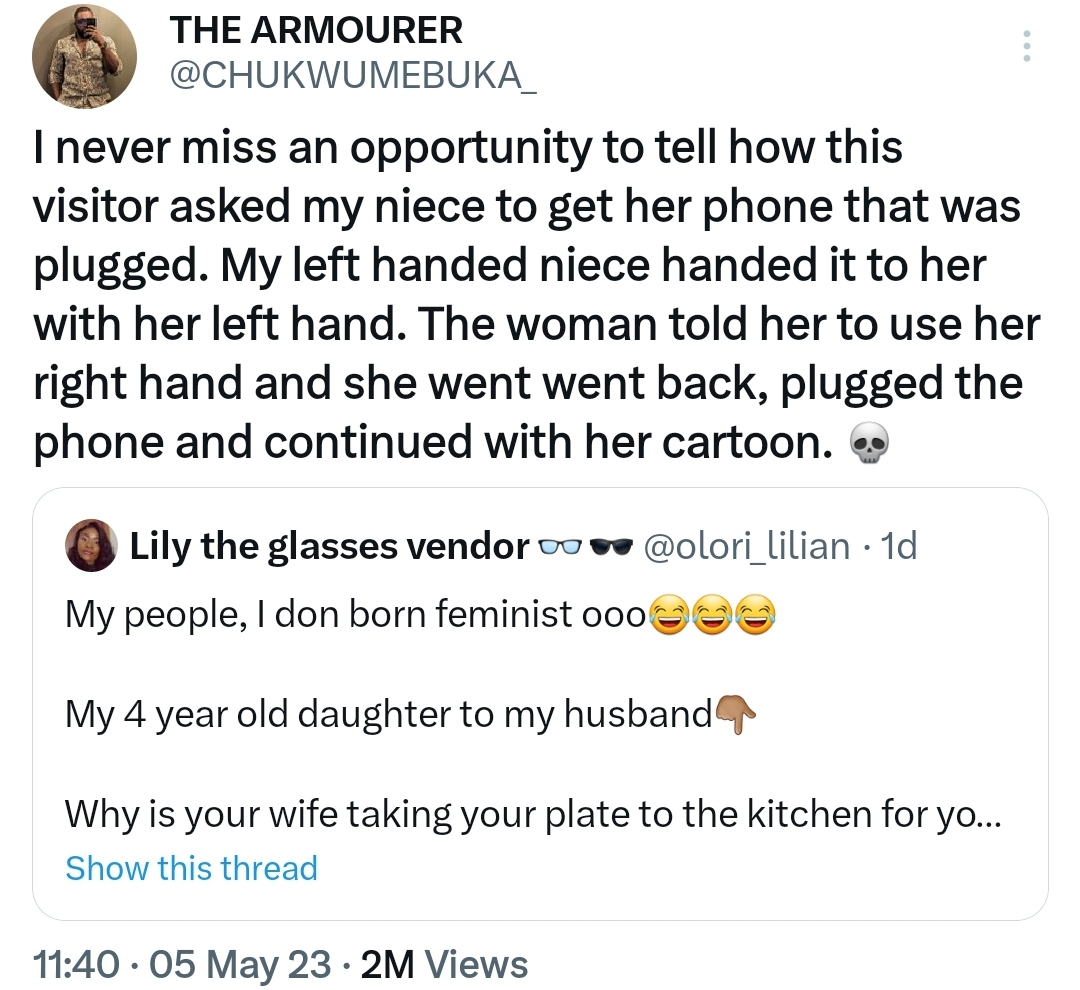MIRROR THOUGHTS: Parenting Is The Most Important Job — Do It Well
My mind was engaged in as soul-searching about a contemporary issue to analyse when I came across a tweet while traipsing through my Twitter timeline, regarding parenting with its attendant ripple effects on the society.
The (vexatious) tweet elicited reactions from Netizens about the laissez faire manner new-age parents conduct their affairs.
It reads;
I never miss an opportunity to tell how this visitor asked my niece to get her phone that was plugged. My left handed niece handed it to her with her left hand. The woman told her to use her right hand and she went went back, plugged the phone and continued with her cartoon.
 Reminiscing on my childhood, there were many moments that I got berated or smacked for making a mess, despite repeated warnings aforehand — the margins of error for ‘cajoling’ an unruly child was too high for low-income households.
Reminiscing on my childhood, there were many moments that I got berated or smacked for making a mess, despite repeated warnings aforehand — the margins of error for ‘cajoling’ an unruly child was too high for low-income households.
Read Also: MIRROR THOUGHTS: Quit Making Excuses For Mediocre Fathers
I don’t hold these things against my parents. They parented in a different time with less resources and even less research into this kind of thing.
But therein lies the problem.
Over years and years of seeing these styles of parenting modelled to me by being on the receiving end, I think it wrote a mental playbook for me of what parenting should look like.
Then, it lay dormant in me for many years until I became a dad. In times of stress and not knowing what to do or how to handle a volatile situation, our minds quickly scan through this book and pick a response that we’ve seen before.
Think about it – how often do you catch yourself saying something to your child, and then thinking “oh shit, I just sounded like my mum/dad”?
While these playbook has its success, it also has its drawbacks and the problem becomes more pronounced the further you go back.
If like me, your parents wrote your mental parenting playbook, who wrote theirs? Their parents. And who wrote theirs? If they weren’t doing gentle parenting in the 1980’s or 1990’s, you can bet they weren’t doing it in the 1960’s, or the 1930’s, or even earlier than that.
But no matter how far you go back, those lessons have been passed down generations for centuries, just like that ugly-as-fuck grandfather clock that’s in your parents house, and you know one day will end up in yours.
So why does this make FIRM PARENTING in the present day so difficult for some of us? For me, it’s a mix of things.
Too many of us conflate firm parenting with letting their children get away with disrespect under the guise of ‘not quelling their voices’ — it is a delicate balance because children DO NOT understand the consequences of their (in)actions, which is the reason you are primarily a parent; being their friend comes secondary.
Firm parenting certainly requires patience, which is one thing many of us were never shown. How are we meant to show patience and understanding of negative emotions or behaviour when we were never shown how to do those things by our parents? For most of us, we were shown one way, and so our instincts want to go in that direction. Fighting against that nature is inherently hard.
Nonetheless, in a bid to be ‘better’ than our parents, many have become too permissive, allowing their children get away with flagrant disrespect.
In a way, I guess there’s also some resentment there. I really hated being talked down to or shouted at as a kid, let alone being hit. I remember cowering in the back of the car every time I got in, even if I didn’t know whether I’d done something wrong or not during that day’s outing. I’d purposefully sit in the seat behind the driver, so my mum couldn’t reach me to smack my legs.
Contrast that with my three-year-old tearing the place apart because she can’t watch her favourite cartoon after dinner– my brain is reading the mental parenting playbook and saying, “You didn’t get to act like this. Are you just gonna let her get away with that?”
Part of that resentment is unresolved childhood trauma. When I say childhood trauma, I don’t mean what most people think it means – it doesn’t have to mean domestic violence or sexual abuse.
Dr. Gabor Maté defined trauma in this interview as:
…not what happens to you, it’s what happens inside you as a result of what happened to you. Trauma is that scarring that makes you less flexible, more rigid, less feeling and more defended.
When you take the stigma away from the word, I’d definitely say most of our experiences, growing up were traumatic. It doesn’t make our parents bad – they did the best with what they knew at the time.
But it has shaped the way I’ve instinctively sought to act whenever my child displays behaviour that I don’t agree with. It’s made me less naturally open to accepting her feelings and emotions in that particular moment, and more rigid in my way of thinking that there’s only one way to deal with the situation: how my parents would have dealt with it.
My emotions were not given the space or time they deserved when I was little. I didn’t feel seen or respected; I felt voiceless. And so now, when I see my child openly disregarding instructions or disobeying the structure that we’ve put in place for her, those same feelings come up once again, and my sub-conscious wants to deal with them the only way I instinctively know how. I wasn’t given patience or understanding; why should she get it?
These inner monologues sound rather childish. But that’s exactly what they are – they are echoes of my inner child. I know I’m sound very new age-y now, but my thoughts speak in that voice because those issues were unresolved in childhood.
For me, this firm parenting approach that I’m committed to now is not just about being calm and understanding with my children – it’s about being the same way with myself.
I’m trying to tell myself that I did deserve to have my feelings and emotions handled better when I was a child, and that I don’t want my daughters to ever feel the same way when they’re my age.
Now, this is very important — part of being a firm parent is to entrench respect in your kid while being the model example. Emotional intelligence while considering your culture and society also comes into play but does this mean your child must not voice her displeasure? HELL NO!
God knows many adults also abuse their priviledge and bank on a child not being comfortable discussing with their parents.
So now I have to pay it forward. I have to do my part in breaking the cycle of that outdated mental playbook being handed down over and over again.
I say do my part, because in truth I might not be able to resolve everything in this generation. I still have plenty of days where I snap and shout, or say things in a tone that I regret later. I sometimes wonder whether my daughter will be writing about me in the same way in thirty years’ time.
Firstly, we don’t have to do it by the book all the time. In fact, renowned parenting expert Sarah Ockwell-Smith advocates for the 70/30 rule, whereby we do our best for seventy percent of the time, and let the other thirty percent slide.
So if you’re getting to the end of the day, you’ve had a guts full of doing everything by the book and your kid won’t eat their dinner without the iPad on, this is your permission to go for it. That thirty percent won’t reverse the seventy.
The second? Consider this: we’re the first generation in our entire lineage to be pushing back; trying to turn that generational cycle in a different, better direction. Yes, we might not be the ones to completely rub out everything in that mental playbook, but it’s a fucking start.
And that’s got to count for something.

